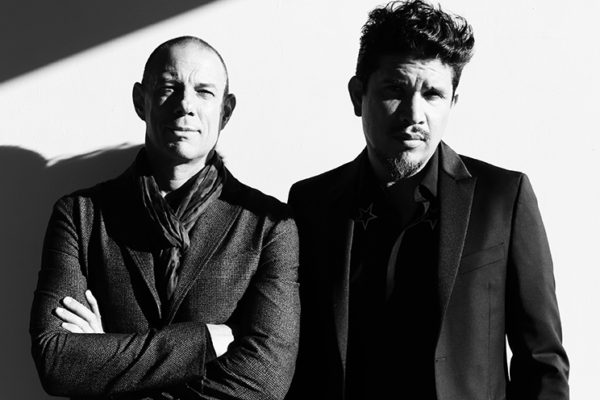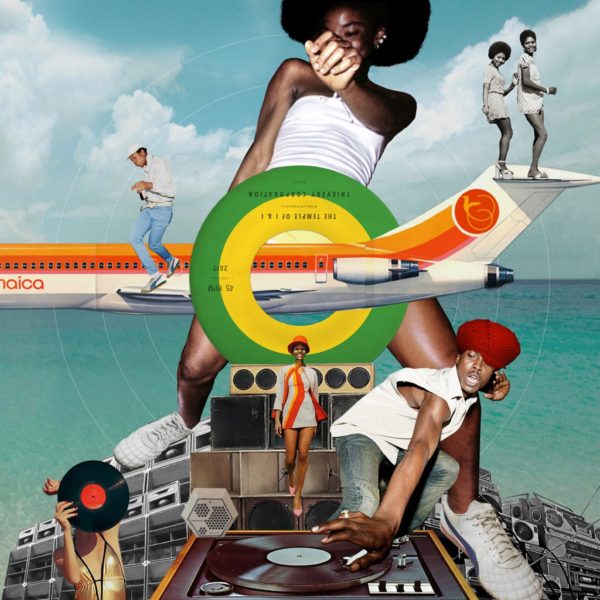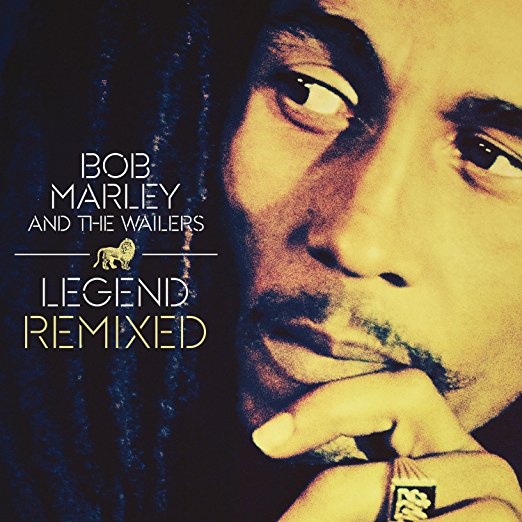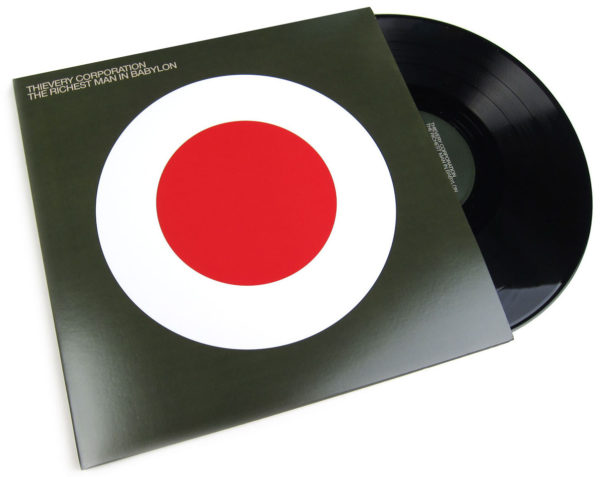interview by Michael McCarthy
Rob Garza is one half of the duo known as Thievery Corporation, which he created with Eric Hilton during the summer of 1995 in Washington D.C. at the Eighteen Street Lounge. Their sound is big on dub, dancehall, house and other types of music, but they are considered pioneers of both electronica and trip-hop. I’ve been following their career since their first album, of which there are now 8 studio albums, 2 remix collections and 2 DJ mix albums. How many electronic artists can say they’ve released that much music? One of the best things about them is that regardless of what sound they’re doing, it always still sounds like a Thievery Corporation, which is dreamy – almost otherworldly – and intoxicating. Other artists have done the styles they’ve incorporated but tend to lose their identity when doing so. In other words, when artist A does a house song, it just sounds like any old house song. But when Thievery Corporation does a house song they still sound like Thievery Corporation, just drawing on whatever source of inspiration they happen to find interesting at the time. More importantly, Thievery Corporation’s albums always sound fantastic, their production never failing to be exquisite and lush. On their mighty impressive new album, The Temple of I & I, due out February 10th, Jamaican music is one of their primary influences and to make sure it sounded authentic most of the album was actually recorded there in Port Antonio, often referred to as “the real Jamaica” (as opposed to the tourist trap Jamaica). Suffice to say, they delved deep into the heart of the music they wanted to make and the results are warm and inviting, as Port Antonio itself is often described as.
MM: I know you guys are a duo, but who handles what within the duo?
RG: We do a bit of everything when it comes to writing, playing, producing. Each song is different. There are some songs where we each pick up different instruments for each song. It’s very collaborative.
MM: Which instruments do you play?
RG: I can kind of play a little bit on a lot of instruments. I’m not technically a virtuoso on any one particular instrument. I think the same thing with Eric. We’re great with coming up with ideas and sketches and using the studio as an instrument.
MM: Your new album is named after the title track, which is “The Temple of I & I.” Who came up with the title and could you explain what it represents to you?
RG: “I and I” is we like in Jamaican and Eric actually came up with the title for that. It’s “I and I,” kind of like talking about me and you but recognizing the “I” part of both of us. That’s sort of the concept idea.
MM: Who does the lead vocals on “Time and Space”? I really like the French lyrics.
RG: Yeah, that is a singer Lou Lou [Ghelichkhani], who’s been with us since our second album The Mirror Conspiracy. And on various records she sings in French, English and Farsi.
MM: How does the songwriting process usually work in terms of the collaborations with the singers? Do they contribute to the lyrics or do you guys write them and then they just sing them?
RG: It depends on the song, really. For instance, on “Time and Space,” Lou Lou came up with the lyrics mainly because she started the song in French and neither me or Eric speak French. On other songs it’s been collaborations with the singers. Sometimes me and Eric have come up with the lyrics ourselves.
MM: Was the new album completely recorded in Port Antonio in Jamaica or was it just inspired by the sounds there?
RG: No, we did all of the tracking down there – pretty much, I’d say about ninety percent of the tracking – and then we came back to Washington D.C. and there were parts that we over-dubbed and added to [and] some other vocal sessions and things like that.
MM: Was that your first time going to Jamaica?
RG: No, we’ve been there years ago where we performed in Kingston. We did a DJ gig. It was our first time recording down there. Jamaican music has been a huge inspiration for Thievery Corporation and, you know, the bass in terms of Jamaican dub and dancehall and everything has been a corner stone of our sounds. So, it was great to go down there and just really be there for a few weeks and get in the groove and just park ourselves in the studio and record music.
MM: What programs do you guys use when you’re making music?
RG: We use Pro-Tools for recording. I like to do a lot of sketches in Ableton. For me, it’s very easy. But when we’re actually recording live instruments and everything Pro-Tools is our go-to.
MM: Do you work specifically with the live tracks themselves or do you do a lot of samples and looping or that sort of thing?
RG: We do a combination of the two. There are some tracks that are played start to finish by the instrumentalists and there’s other bits that sometimes we’ll get just a really good line and we might loop it and use that particular bit throughout the song at different moments. It’s really a combination. I think that’s one of the great things about electronic music is, you know, you’re really liberated. When it comes to the creative process, you can do things however you want whether it’s copying and pasting or cutting things up or letting things roll. All these things are dependent on the song.
MM: What are your plans to tour behind the new album?
RG: Well, we’re getting ready to head to Europe to do a European tour in February and then we’re gonna be doing a bunch of shows here in the states for summer and next fall and winter.
MM: What countries are you historically most popular in?
RG: You know, Greece is a great audience for us. We’ve had a really fantastic relationship with the Greek audience and also Portugal. England as well. Australia. There’s a lot of different random corners of the world.
MM: Would you say that you’re most popular overseas then as opposed to here in the States?
RG: I would say we’re most popular here in the States. It started off overseas, but then I think, you know, people here in the States caught on and we’ve really built that up over the last two decades with touring live and putting out music that has just grown and eclipses what is happening in Europe.
MM: You released an album of remixes called Versions back in 2006. Have you remixed any artists lately?
RG: We have not in a little while. We’ve just been working on our own music, but we are gonna be doing something for Paul Simon. There’s a remix album coming out of Graceland. Actually, you know what, I take that back. We did do a remix a couple years ago for the Bob Marley estate of “Get Up, Stand Up.”
MM: Have you thought about doing a remix contest where you invite fans to remix one of your songs and then you pick a winner and release it?
RG: We actually have talked about that. Now that people are downloading stems and things I think it’s a great idea.
MM: You guys have been on my radar pretty much since the beginning so I’ve never really known how popular you were at any given time. When would you say you’ve peaked?
RG: You know, I think that it’s interesting because in terms of touring and everything we’re playing to bigger audiences than ever and things have grown so it’s hard to say that it’s really peaked. It’s been a consistent slow burn, I think, throughout the years. It’s been constantly growing, which is great. We’re not one of those artists where you have a number one hit and then you’re huge and you start to fall. For us, I like to think of us as a no hit wonder as opposed to a one hit wonder. People love the music because they really appreciate it. Not because they’re familiar with one massive popular song that’s been on the radio. It’s more of an appreciation for the whole catalog.
MM: You guys have been self-releasing your music from day one. Has it always been by choice or were you looking for a record label early on and nothing panned out? How did you get started?
RG: We had a few offers from major labels back when we started and right at the same time we got offered a distribution deal from a pretty big distributor. So, it’s called a P&D deal, packaging and distribution where they make records and we get our distribution fee and we realized that it could be a lot more lucrative for two individuals making music in a record room. I think it’s what allowed us to have a sustainable career over all these years. Because to be a success on a major label you have to sell a ton of music. For us, we’ve been able to sell each release a few hundred thousand copies here and there and actually have a great career and making more money than we would have if we signed with a major label.

MM: You were heavily associated with trip-hop early on in your career. Did you ever sense that you were helping to create a new sub-genre of music?
RG: No. I mean, we just really concentrated on what we were creating in the studio. I don’t think we ever thought to create a new sub-genre of music or anything like that. It was just really following our inspiration musically and it just so happens that we’ve been doing it for so long, and before a lot of others, that it’s come to pass that it has been part of this sub-genre of music.
MM: You had a song on the Garden State soundtrack. I know that soundtrack pretty much catapulted The Shins to fame since they were mentioned in the movie. Did you guys get a big push from that inclusion?
RG: Yeah, you know, it’s crazy because I remember the licensing request came across our desk and our record label in D.C. and it said we’re doing this small independent movie called Garden State and then it blew up and had the success that it did and I think one of the things people loved as well was the soundtrack. So, all of a sudden, a lot of people started to know about Thievery Corporation, which was great.
MM: What are your thoughts on Spotify and streaming in general? Where you’re your own label, is that making it better for you than some artists?
RG: Yeah, you know, we weren’t happy about streaming services in the beginning because we lived during the heyday of actually selling CDs and vinyl and things like that. So, we weren’t thrilled about it but it’s a lot better than downloading. Before, not too many years ago, people were just downloading music for free and not paying anything. So, at least now that more people are adopting the streaming model we’re starting to see that it’s becoming better – not totally great – but it’s becoming better in terms of making money from recorded music, which, being recording artists, is very important.
MM: You mentioned vinyl. Are you a fan of vinyl? Do you have any thoughts on its resurgence?
RG: I am a vinyl fan, especially of old, obscure records from the sixties and seventies. You know, I think that people want to have that connection with the music. The tactile connection of holding something, putting it on a record player. I think it’s more sensory. The fact that it’s visual. You hear it, you touch it, so it engages the senses more than having something on a laptop or iPhone.
MM: You guys have felt very strongly about some political views in the past. Is there anything you’re especially passionate about right now?
RG: I think that over all, people ask us about what we think of the whole thing with the presidency and I think our views are more universal than partisan politics. Kind of more of a big picture kind of thing. We’ve never really believed [or] had so much faith in the system to save everybody. Especially being from Washington D.C. So, I think that it’s more kind of a universal and political and socially conscious message that permeates what we do.
MM: You’ve always been big proponents of peace, which I think is great. Let me ask you though, do you think President Obama should have pardoned Edward Snowden?
RG: Um, do I think so? I do. That’s very personal.
MM: What human rights and food programs and stuff are you involved with at this point?
RG: Well, World Food Program, we do stuff with them occasionally. We’re just doing various local things in the community and things like that. Eric’s in D.C. and I’m here in SF, so it’s just random things here and there when we can.
MM: I’ve got a question from our random questions bank that we’re asking people – if someone was giving you a million dollars to give to charity and it all had to go to one charity or cause, which would you give it to?
RG: Definitely something – probably something in terms of poverty and children and food related. Because I think that is just a fundamental need and people who tend to be in that situation, especially children, it’s just the lottery of where you’re born, you know?
MM: Yeah, it’s not exactly fair.
RG: That would be one of the most essential things that would be my first instinct to donate to.




Leave a Reply